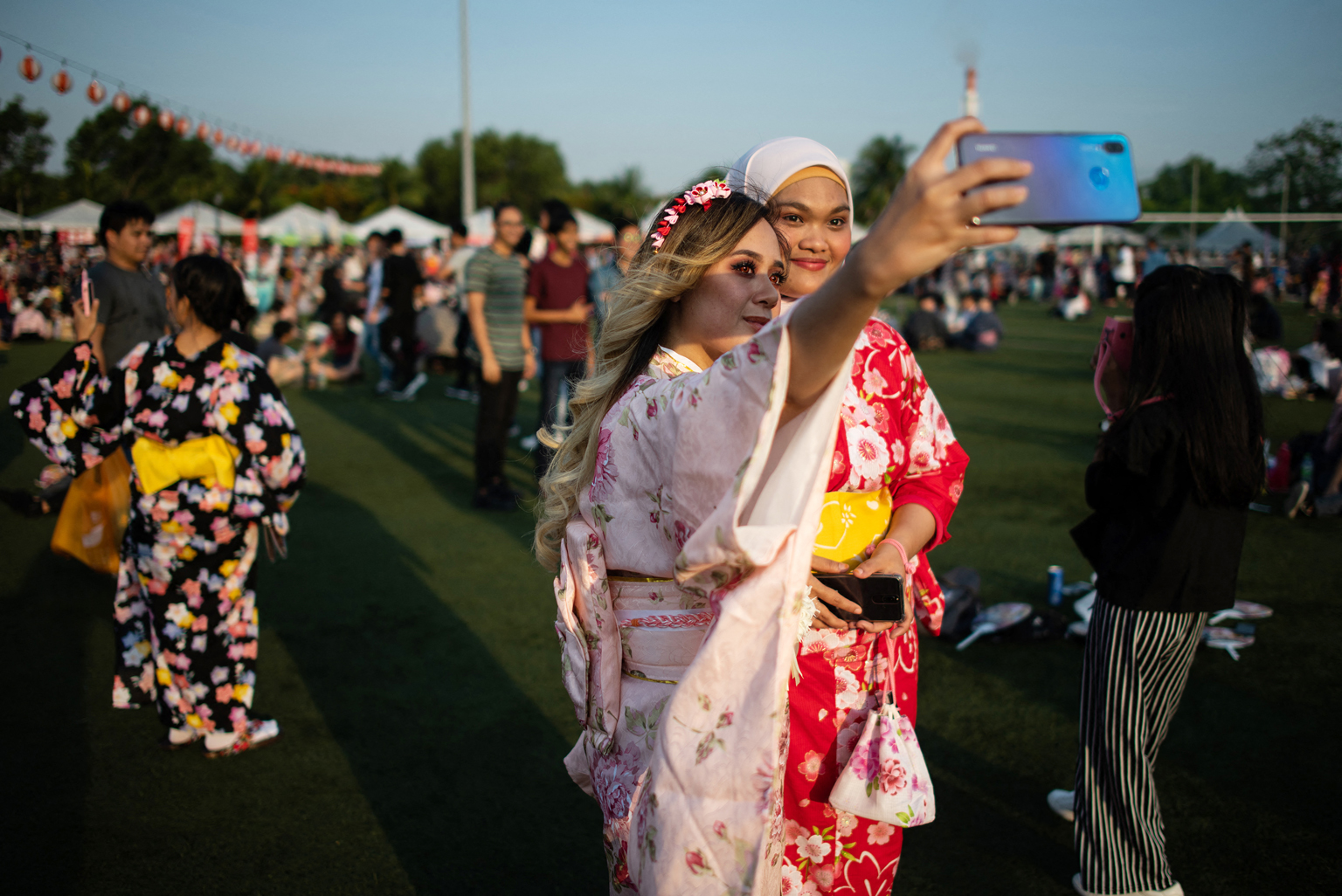Bon Odori - a dance-off between revivalism and multiculturalism in Malaysia
The Bon Odori controversy caused by warnings to Malaysia’s Muslims not to participate in a Japanese-inspired dance festival raises important questions about how Malaysia can sustain its multicultural character against the rising tide of Islamisation.
Sign up now: Get ST's newsletters delivered to your inbox

The annual Bon Odori festival celebrations in Shah Alam, on the outskirts of Kuala Lumpur, in 2019.
PHOTO: AFP
Earlier this month, a kerfuffle emerged over whether Malaysian Muslims should attend Bon Odori, a Japanese summer dance festival in July, which has been held annually in mainly Penang and Selangor for over 30 years.
On June 6, Minister in the Prime Minister's Department (Religious Affairs) Idris Ahmad, who is also vice-president of Parti Islam SeMalaysia (PAS), advised Muslims against participating in the festival, as the Department of Islamic Development Malaysia (Jakim) found that it contained elements of other religions and could therefore affect Islamic beliefs.
This warning was echoed a day later by the Mufti of Penang who warned that "Muslims must always preserve the purity of their Islamic faith".
As the head of Islam in his state, the Sultan of Selangor rose to the occasion to propose a more inclusivist approach to Bon Odori. He said that he did not observe any religious elements which could threaten Islamic beliefs when he attended it in 2016.
Emphasising that it is a cultural festival, he encouraged Mr Idris to experience it for himself, lamenting that the minister used Jakim to make confusing and inaccurate statements. Despite this, PAS' Ulama Council and women's wing continued to warn Muslims against attending.
In Japan, Obon celebrates summer but also involves folk dances that recall Buddhist and other traditions commemorating the spirits of the dead. Within the Malaysian context, however, Bon Odori is organised by expatriate Japanese groups as well as locals to promote cultural exchange between Malaysia and Japan. For instance, the event poster for this year's celebration features an illustration of a kimono-clad woman in a hijab, symbolising this cultural exchange.
Yet, promoting cultural exchange in multicultural Malaysia is not as straightforward as some would expect. Some revivalists within Malaysia's political and Islamic elite have shown a tendency to Islamise cultural practices.
While this may have been previously limited to Malay culture, this Islamisation - rooted in a puritanical and exclusivist mentality that seeks to "protect" Islam - has also pushed against other cultural manifestations, as evidenced by the controversy surrounding this year's Bon Odori.
According to some observers, PAS' continued advice to Muslims to avoid the festival was perceived as outright defiance against the Sultan. While PAS dismissed such accusations as provocation from the opposition, the aftermath demonstrates a potential struggle for religious and cultural influence. The Sultan has summoned PAS Selangor chief Ahmad Yunus Hairi to his palace, a clear signal of the Sultan's power in managing Malay-Muslim affairs.
In the meantime, the Mufti of Perlis proposed that the festival be given a new name so as to avoid any confusion with the original festival in Japan. This half-hearted gesture reflects poor reasoning and is at best a cosmetic treatment for the deeper divide between the puritans and the rest of the Malaysian Muslim community.
Siege mentality
This concern with protecting Muslims' faith and "avoiding confusion" illustrates the siege mentality which has grown in Malaysia's culture, religion and even economy since the 1970s because of state-led Islamic revivalism.
Revivalist state actors and elites started out to Islamise the public sphere, and this has spread to the policing of even cultural events deemed detrimental to the "purity" of the Islamic faith. A more recent manifestation of the trend in politics is the appointment of PAS leaders to key government positions.
An earlier cultural example is Mak Yong, a traditional dance performance, which was banned by the PAS-controlled Kelantan state government in 1998, as its pre-Islamic origins and elements were perceived as un-Islamic.
While the ban was lifted in 2019, the government emphasised that Mak Yong would have to be Islamised by being syariah-compliant and should not contain any "un-Islamic" worship.
There is also the long-running controversy over the use of the word "Allah" by non-Muslims, which government and Muslim authorities claimed would confuse Muslims and threaten national security.
PAS and Jakim's attitude towards Bon Odori is no different. Their siege mentality does not bode well for the socio-religious outlook of Muslims or non-Muslims in Malaysia, nor for inter-ethnic and inter-religious relations.
Not only are the religious authorities belittling Islam and Muslims by constantly claiming that Muslims need "protection", but Malaysia's Muslims are also prevented from participating in socio-cultural events that can promote inclusivity and appreciation for other cultures and faiths. This could breed ignorance, exclusivism and ultimately intolerance, which will be dangerous for a multicultural Malaysia.
Several commentators have praised the Selangor Sultan for protecting Islam from politicisation. He had warned that nobody should take advantage of such sensitive issues for their personal or political gain and popularity.
However, this incident might set a precedent for the Sultan, and perhaps other cultural and religious figures in Malaysia, to take on a stronger role in protecting multiculturalism in Malaysia beyond Malay or Muslim affairs.
This might have to be the way forward if Malaysians are to counter the forces at play in the larger conservative turn towards greater Islamisation, which threatens to rend Malaysia's multicultural and multi-religious fabric.
- Faris Ridzuan and Afra Alatas are research officers in the Regional Social and Cultural Studies Programme at the ISEAS - Yusof Ishak Institute. This is an edited version of an article first published in Fulcrum, the institute's commentary and analysis website.


